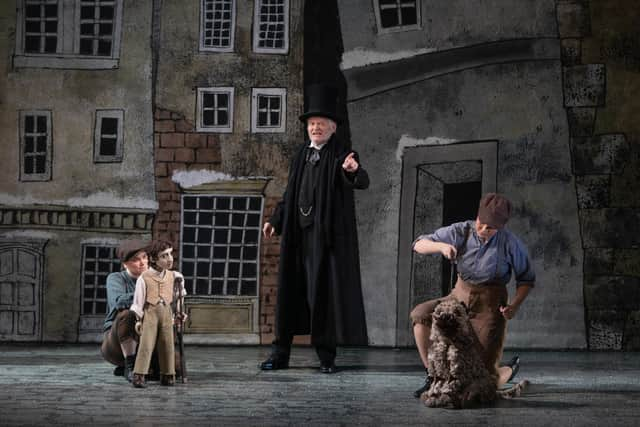Theatre review: An Edinburgh Christmas Carol, Lyceum Theatre, Edinburgh
An Edinburgh Christmas Carol, Lyceum Theatre, Edinburgh ****
No theatre-maker alive does it better than writer and director Tony Cownie, when it comes to putting a comic vision of the city of Edinburgh on stage, warts and all. From Liz Lochhead’s version of Tartuffe to his own magnificent take on The Belle’s Stratagem, back in 2018, his satirical tales set on the streets of the capital are always a joy; and now, the Lyceum Theatre celebrates this most vital of Christmas seasons, for Scotland’s theatre economy, by reviving his 2019 version of Dickens’s A Christmas Carol, set in the shadow of Edinburgh Castle in the year 1857, just 14 years after the tale was first published.
Advertisement
Hide AdCownie’s central idea is to relate Scrooge’s meanness, and his refusal to celebrate Christmas, to Presbyterian Scotland’s stern refusal, for more than 200 years after the Reformation, to celebrate those feasts of the Christian calendar that merrily combine the pious and the pagan. This Christmas Carol therefore takes place in a city where Scrooge’s meanness of spirit is not only a personal choice, but a stance validated by the public authorities; and the Lyceum’s community choir of carol singers are regularly chased from the stage not only by Scrooge, but by a chunky policeman, trying to eradicate the festival from the streets.


The result is a version of A Christmas Carol where the clean and perfect moral lines of Dickens’s story – the deep conflict between true Christian virtues of human kindness, joy and conviviality, and Scrooge’s self-inflicted mercantile world of miserly greed and money-worship – are slightly blurred by cultural considerations that don’t quite fit its shape, and certainly complicate Scrooge’s motives. Yet what Cownie’s version loses in clarity and intensity, it tends to gain in pure and joyful theatrical fun, as Crawford Logan’s finely-honed Edinburgh Scrooge wrestles with three distinctively Scottish apparitions of Christmases lang syne and yet to come, and the Cratchit family feature in a gorgeous comic sub-plot involving Greyfriars Bobby, who, as an unlicensed dog, is about to be ejected from his master’s grave in Greyfriars Kirkyard and seized by the cruel city dog-catcher.
Steve McNicoll therefore delivers an impressive turn as a massively kilted Christmas Nouadays, Nicola Roy is both exquisite as Scrooge’s neglected love Belle and hilarious as a range of no-nonsense Edinburgh wives and housekeepers, Richard Conlon and Belle Jones head up a cheery and heart-rending Cratchit family, trying to survive on the miserable wage Scrooge allows his clerk; and the show’s perfectly-judged use of two terrific puppets (by puppet director Edie Edmundson) as Greyfriars Bobby and Tiny Tim propels the action into some wonderful moments of pure family entertainment, greeted with shrieks of delight by the children in the audience.
At the heart of the story, of course, lies Dickens’s profound anger at the human consequences of untrammelled capitalism, practised without human decency or compassion; and sadly, as the original Scrooge evicts his desperate tenants, and starves Bob Cratchit of a living wage, that rage and despair appear almost as timely now as they did back in the 1840s, after a long period when they seemed like portraits of a long-gone past.
Despite the strength and subtlety of Crawford Logan’s central performance, though, Cownie’s version of the story is not one to dwell too deeply on the political meaning of Scrooge’s journey from institutionalised greed to a new and generous humanity. It’s rather a joyful celebration of that journey, wrapped in much song and a rich vein of humour, and rounded off with a glorious and magical shower of snow; not only over the old streets of Edinburgh conjured up in Neil Murray’s magical set, but across the auditorium, and into the upturned faces of a delighted audience, who know that Christmas is here at last.
Until 31 December